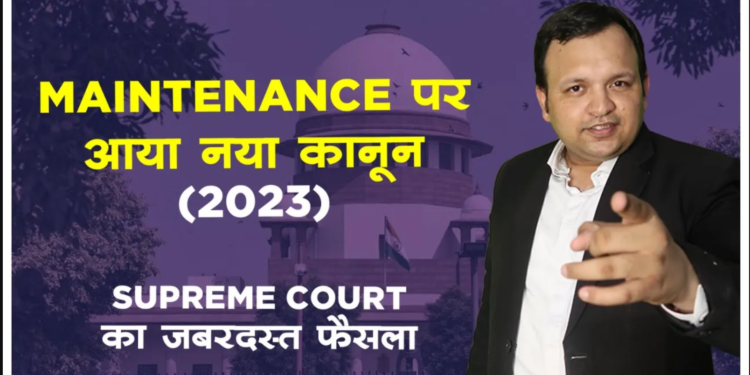In India, the right to request maintenance is a legal right that cannot be relinquished through any agreement between the parties. Maintenance can be awarded either during court proceedings (known as maintenance pendente lite) or after the procedures have concluded (known as maintenance final), which is a form of permanent maintenance. Spouses, offspring, and guardians all possess the entitlement to pursue financial support. According to the specific personal laws, husbands who are unable to support themselves are also entitled to request financial support. The concept of maintenance aims at putting the party back in the same position of comfort and lifestyle as he was at the time when his marriage existed.
The Supreme Court has on multiple occasions set a standard for the exercise of such a right as well as reiterated those guidelines and directions, in the best interest of justice. In a landmark judgment, Aditi Mithi v. Jitesh Sharma, the supreme court, while furthering the guidelines issued in two landmark judgments, Rajnesh v. Neha and Neha Tyagi v. Lieutenant Colonel Deepak Tyagi, pronounced a judgment.
Feel free to contact us at, https://thelegalshots.com/legal-opinion/
BRIEF FACTS OF THE CASE
In 2008, the parties solemnized their marriage. The parties had two children from the marriage and as the tensions increased, the parties decided to live separately. The daughter, who was a minor decided to stay with her mother, while the son lived with his father.
As matters became more complex and took a turn for the worse, the husband filed a divorce petition in the family court. Subsequently, the mother filed an order of maintenance under Sec 125 of the Code of Criminal Procedure. While the family court granted the divorce, the order of maintenance was left pending at first.
The Family Court, after taking due consideration of the parties, allowed for maintenance for the daughter and the amount decided was Rs. 20,000/-. However, the court did not grant maintenance to the wife as alimony was being given to her.
Aggrieved by such an order of the family court, an appeal was filed by the husband in the high court. He stated that he was suffering severe financial losses due to his business fizzling out.
The High Court without taking due consideration and without giving proper reasoning, reduced the amount to Rs. 7500 /-.
The case was sent for appeal again, in the Supreme Court, filed by the daughter citing, that the reasoning of the high court while decreasing the amount was absent and the proper procedure was not followed by the court.
The Supreme Court considered two landmark cases while deciding on the matter, namely, Rajnesh v Neha and Neha Tyagi v. Lieutenant Colonel Deepak Tyagi.
In Rajnesh v Neha, the court acknowledged that there are times when either party exaggerates his or her situation or hides his or her income to pay less maintenance.
To tackle such a situation, the court gave directions to claim maintenance. An affidavit must be filed by both parties, which has been stated in the judgment itself. The copies of the affidavit will be filed in the Family Court and the court will pass an order per the submissions. If any party must file a reply, then a maximum of 2 adjournments can be requested by the parties. If there are any subsequent changes in the process of trial, such changes have to be notified to the court. If any party claims anything false or contrary to the real situation, then under Sec 340 CrPC, criminal proceedings will be filed against him or her.
Citing the case the Supreme Court questioned the High Court, that the guidelines were clear in the case of Rajnesh v. Neha, yet the court did not follow them.
Furthermore, the court cited Neha Tyagi v. Lieutenant Colonel Deepak Tyagi. The judgment in such a case laid down, even if the divorce is finalized, the father must maintain and take care of his minor children until they attain majority.
JUDGEMENT
The Supreme Court set aside the order of the High Court and upheld the order of the Family Court. Additionally, the court laid down that the secretary general of the supreme court will provide copies of the affidavit mentioned in the case of Rajesh v Neha, to all the judicial officers of the High Court and the Family Court.
Any claim of maintenance under any act will have to follow the guidelines under the case. if such an order is not followed, then the impugned order will be set aside by the Supreme Court.
CONCLUSION
The laws made for maintenance are crucial legislations aimed at safeguarding the rights of mothers, children, and elderly individuals who are weak or ill. These statutes ensure that individuals have the necessary resources to live and support themselves, preventing them from enduring life on the streets without access to food or shelter. This legislation ensures that there are no wrongful convictions and that it enhances the provisions as needed to amplify and clarify the existing rights. The primary objective of awarding maintenance is to uphold the living standard of one party to match that of the other party, in line with their pre-separation status. The Supreme Court through its landmark judgment established and ensured equity and justice in cases of maintenance.
To understand such complex law in simple ways, stay connected with www.thelegalshots.com
If doubts persist, contact our Legal Experts at https://thelegalshots.com/legal-opinion/




